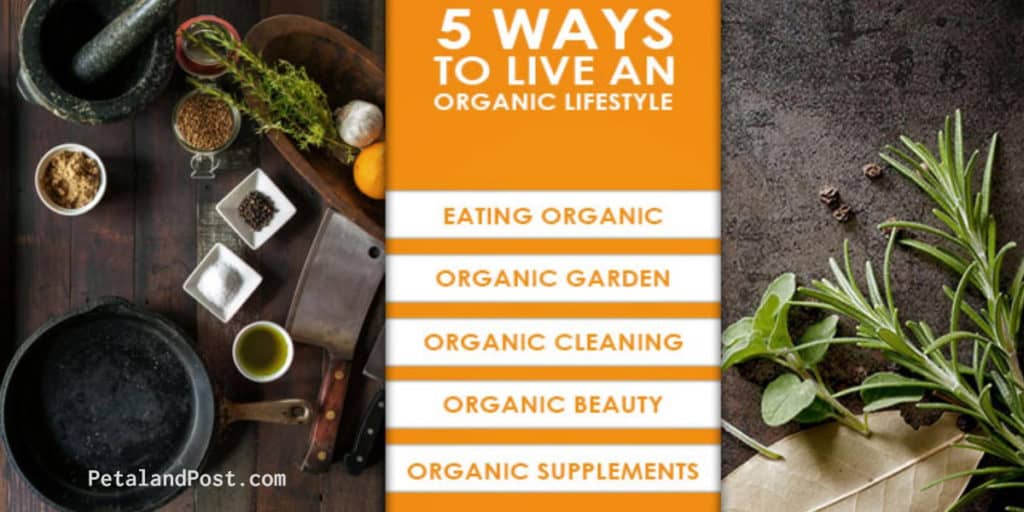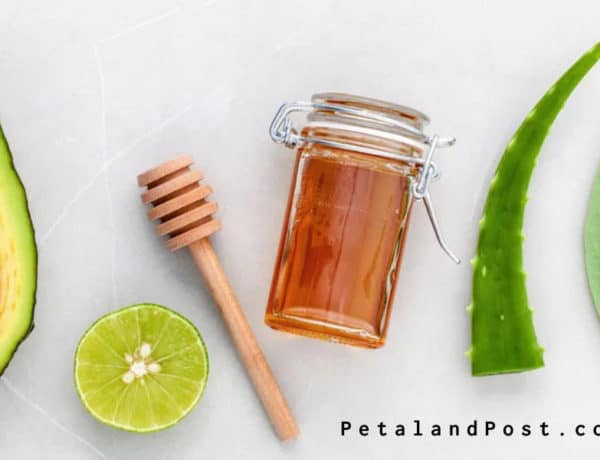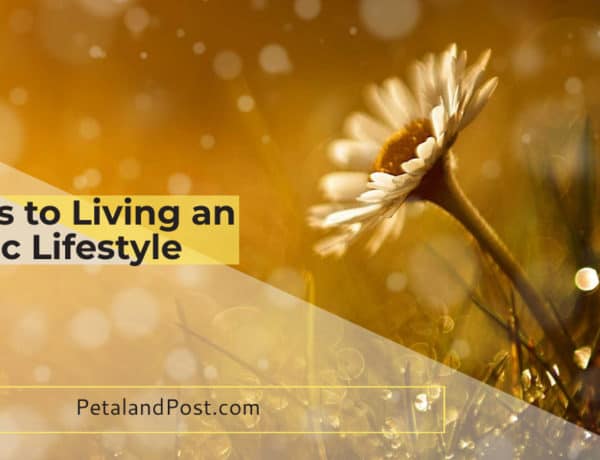Living an organic lifestyle is more than tweaking just your food. It is instead a commitment to act responsibly towards the environment and contribute to its sustainability. Switching to a completely organic lifestyle in a go can be a daunting step.
Instead, it is better to choose to switch gradually and form habits along the way. From organic foods to organic skincare, you will have to incorporate various changes to your every day routine.
Read ahead as we discuss the 11 steps to live this lifestyle.
Contents
- 1 Steps to Begin Living an Organic Lifestyle
- 2 Are Natural Cosmetics Better?
- 3 Top 9 Natural Living Must Haves
- 4 11 Steps To Living An Organic Lifestyle
- 4.1 2. Buy Your Food at the Local Market
- 4.2 3. Grow Your Own Produce
- 4.3 4. Cook Your Way to an Organic Lifestyle
- 4.4 5. Using Organic Products in Your Home
- 4.5 6. Using the Right Personal Care Products
- 4.6 7. Try to Purchase Pre-Loved Clothing
- 4.7 8. Pick Environment-Friendly Methods of Traveling
- 4.8 9. Concious Driving Decisions
- 4.9 10. Opt for Public Transportation As Often As Possible
- 4.10 11. Know Your Labels Well
- 5 How to Live an Organic Lifestyle on a Budget?
- 6 What Are the Benefits of Eating Organic Food?
- 7 Summing It Up
Steps to Begin Living an Organic Lifestyle
We discuss the 11 steps that will help you live an organic lifestyle below.

1. Add Organic Foods to Your Diet
The best way to begin living the organic lifestyle is by making the switch to organic food. It helps improve your health and is beneficial to the environment as well. Your food will be free from any chemicals. Further, this food tends to taste better and is more fresh and nutritious as well.
Begin by looking for food that is certified organic. For instance, certified organic eggs are laid by hens that are not fed any antibiotics and hormones. Hence, this food contributes substantially to your health. If you want to take an additional step, look for certified humane eggs raised and handled. With this certification, you will eat eggs laid by hens who were not kept locked in tiny cages their whole life.
Similarly, get only meat and dairy products that have been certified organic. In this way, you will be able to help create demand for natural and healthy animal products. The animals would also have been treated humanely.
See Also
2. Buy Your Food at the Local Market
For living an organic lifestyle, it is essential to care about the carbon footprint you leave on the environment. One of the main ways of living an organic lifestyle is to find and buy all the food you want at a local market.
You may indeed have to give up on some fruits and vegetables that are imported. However, you will be increasingly supporting your home economy and acting organically by taking this step.
Visit your nearby farmer’s market or locate other stores that sell organic produce. Some areas even have indigenous fruit and vegetable boxes delivered to your doorstep every day.
These are sourced from small farmers and will encourage you to bring home some new and nutritious organic foods you may not have tried before. These will also be free of any chemicals.
Do note that organic products do not use any artificial fertilizers or pesticides to grow either. Ensure that the products you procure are grown organically. For your dairy, meat, and eggs, try to purchase from small farms in your area.
Some stores offer ready-made organic food. Make sure that the ingredients in these are organic and nutritious too.
3. Grow Your Own Produce
One of the foolproof ways to add organic food to your diet is cultivating your organic garden. You can grow and eat your vegetables and fruits in this way. They are likely to look and taste fresh and nutritious, as too.
By following this step, you will also reduce the amount of plastic you opt for. Many people living an organic lifestyle eat from their garden as they are sure of the ingredients they will have available for cooking.
People also save a lot of money as you only have to purchase some seeds and cheap equipment to begin growing. Following this, you will have a sufficient supply of healthy ingredients for many meals to come.
In addition to this, gardening is also a great hobby that will help you employ your time valuably. It also helps people unwind and relax in the middle of their busy and tedious lives.
It is one of the most productive ways to make yourself an organic life.
4. Cook Your Way to an Organic Lifestyle
The best method to live a natural and organic lifestyle is to make your food. It is a great option to enhance your health. The idea is to look into your kitchen and avoid dining outside whenever you can.
You can go ahead and eat your meals at a restaurant on special occasions. On other days, make them at home. When you eat your meals outside, pick restaurants that serve organically sourced food free of any chemicals.
This will keep you healthy and let the environment flourish.
5. Using Organic Products in Your Home
A critical step to living an organic lifestyle is getting rid of chemicals in your home products. Look for cleaning products that are made of natural ingredients. These may be more expensive than your older cleaning options but are worth the change.
You should exclude any products that contain phthalates or phosphates. Some brands green-wash their consumers by using marketing campaigns that claim to be organic and natural.
However, these often contain palm oil. However, palm oil is not an environmentally beneficial option as the plantations are known to displace wild animals. If you want to buy genuinely organic cleaning products, avoid palm oil.
Using home-made cleaners is also a great idea. You may want to opt for kitchen essentials like salt, white vinegar, baking soda, and even lemon juice to clean many surfaces. They have been traditionally used in households for a long time now.
They do an excellent job in cleaning your space up.
6. Using the Right Personal Care Products
Take a moment and pay attention to the personal care products you have been using on your body. As a simple change, start swapping these for healthier products for your skin and the environment.
You need to be attentive and read the ingredient list. Both words ‘organic’ and ‘natural’ are used in the cosmetics industry and are not regulated. It means that the tag organic does not truly make it so.
A much better option is to start looking at the Environmental Working Group (EWG) ‘s website. Through this, you can maintain knowledge of the environmental and safety impacts of the products you use.
You will have to pay a small expense for making this choice. Another option is to start looking actively for natural ingredients in the product. These are also healthier for your hair, body and facial skin, and intimate hygiene.
Look for natural oils like coconut oil, jojoba oil, and olive oil in your products.
7. Try to Purchase Pre-Loved Clothing
To contribute to an organic lifestyle, you can glance beyond your skin and your food. One rapid step you can take is to get and wear pre-loved clothes as often as possible. Try to locate thrift stores where clothes that have been barely worn are sold at affordable prices.
Yes, you will have the benefits of leading an organic lifestyle and will also help the environment. You can again go ahead and look for organically sourced clothes if you are biased towards new clothing.
8. Pick Environment-Friendly Methods of Traveling
Alternative methods of travel can keep you healthier while being sustainable options. Walking is an excellent method of traversing short distances and boosting your exercise as well. You can also make small changes like cycling instead of taking your car to cover short distances.
You will be experiencing fresh air and will be living a healthier lifestyle.
9. Concious Driving Decisions
If possible, switch to a hybrid. However, if you can’t, there are other changes that you can make that will add up in the long run. For starters, pick a vehicle that has better gas mileage. This makes it fuel-efficient and a better option as well.
You can use a car-sharing or carpool option if you can access one. Plan your car outings so that you can get all your work done in one go. As a bonus, you will be saving up on maintenance and won’t have to spend precious minutes trying to park your car.
10. Opt for Public Transportation As Often As Possible
If you have a bus, train, and metro routes to get you where you want to be, opt for them. Leave your car at home and go for public commuting options instead. You will be saving up on fuel.
If driving is the norm, don’t be afraid to make a change. Public transportation can help your community and the environment in one go. It is an excellent step to take to get started on incorporating an organic lifestyle as well.
11. Know Your Labels Well
To be living an organic lifestyle, you have to understand the labels on any products you purchase. Being part of society, you cannot stop buying. Knowing how to read labels will put you on the right path and help you make the best of your purchase.
You will be minimizing your carbon footprint in the process and directing your demand only where it is beneficial. It is a powerful method to avoid misleading products and pick only what is right for you.
How to Live an Organic Lifestyle on a Budget?
While making the switch to an organic life can be tempting, it can also be expensive if not done right. Similar to all great things in life, it takes some effort and planning. One of the best ways to do this is to make a list of your local farms.
Purchasing from them directly can be a cheaper alternative for you. With skincare and household products, try to prepare them yourself. Before you shell out money, know that your kitchen is an excellent source of many DIY products.
Start loading up on coupons as well. You will have to put in some effort here. Look at fitness magazines and lifestyle blogs, and these will often give you access to some money-saving coupons for organic products.
You can also practice buying in bulk as this tends to be cheaper. Your freezer will be your go-to space now as you will have to store the bulk purchases safe and sound for the next usage.
Finally, know that it is not about the label ‘organic.’ What truly makes an organic lifestyle is consistent actions dedicated to conscious living choices beneficial to your environment and you.
What Are the Benefits of Eating Organic Food?
A key benefit of organic eating is the antioxidants and nutrition present in the food you are consuming. They are clear of pesticides and other chemical components that will harm you in the long-run.
These help prevent cancer, heart disease, and vision problems. They also tackle premature aging and many other issues. Organic dairy and meat are also free of antibiotics. Hence, they prevent you from forming antibiotic resistance.
Hence, any antibiotics that your body requires will be available when you are really in need. Other than the nutritional aspect, food grown in the organic method will simply taste much better.
It will be fresher and full of delicious flavors as the crops are given enough time to grow and mature. Hence, they follow their natural cycle and taste just as they should.
At the end of it all, you should have a robust immune system on your side. You may not see the impact immediately, but they are quite beneficial in the long-run.
Summing It Up
Whether it is nutritious food or beneficial skincare, an organic lifestyle will keep you and the environment satisfied. The long-term effects of adopting such a lifestyle are only positive and will make the world a better place for future generations.
Go beyond your food and pay attention to your clothes, cleaning products, and the method you travel. Collectively, these little positive acts add up to make you a responsible citizen of the world.




No Comments